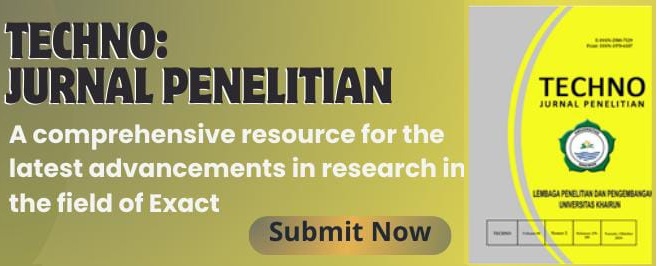Digital Game to Support the Effectiveness of Using Interactive e-Module on Vibration and Waves Concept (IeMVWC)
Abstract
Digital games have the potential to increase the effectiveness of using interactive e-modules. This development research aims to produce an interactive e-module on vibration and waves concept (IeMVWC) assisted by digital games, as well as investigate the impact of its use on student learning achievement. This development research follows the ADDIE stages (Analyze, Design, Develop, Implement, and Evaluate). The data collected in this study includes product validation data, learning achievement data, and student response data collected through validation sheets, multiple-choice questions, and questionnaires. The IeMVWC product assisted by digital games produced is declared very feasible for use in learning and effective in improving student learning achievement in vibration and wave learning.
Keywords
Full Text:
PDFReferences
Astuti, N. H., Rusilowati, A., Subali, B., & Marwoto, P. (2020). Analisis Kemampuan Pemecahan Masalah Model Polya Materi Getaran, Gelombang, dan Bunyi Siswa SMP. UPEJ Unnes Physics Education Journal, 9(1), 1-8. https://doi.org/10.15294/upej.v9i1.38274
Branch, R. M. (2009). Instructional Design: The ADDIE Approach (Vol. 722). New York: Springer.
Chen, C. H., Wang, K. C., & Lin, Y. H. (2015). The Comparison of Solitary and Collaborative Modes of Game-Based Learning on Students' Science Learning and Motivation. Journal of Educational Technology & Society, 18(2), 237-248.
Clark, R. C., & Mayer, R. E. (2011). E-Learning and the Science of Instruction. San Fransisco: Pfeiffer.
Fauziyah, D. R. (2019). Pengaruh Model Inkuiri Terbimbing terhadap Hasil Belajar Peserta Didik SMP Materi Getaran dan Gelombang. Jurnal Pembelajaran Sains, 3(2), 48-54. http://dx.doi.org/10.17977/um033v3i2p48-54
Haerunnisa, H., Prasetyaningsih, P., & Biru, L. T. (2022). Analisis Miskonsepsi Siswa SMP pada Konsep Getaran dan Gelombang. Pendipa Journal of Science Education, 6(2), 428-433. https://doi.org/10.33369/pendipa.6.2.428-433
Haji, N. A., Saprudin, S., & Muhammad, N. (2023). E-Book Interaktif Materi Usaha dan Energi (eIUE) untuk Pembelajaran Fisika di Sekolah Menengah Atas. Titian Ilmu: Jurnal Ilmiah Multi Sciences, 15(1), 15-22. https://doi.org/10.30599/jti.v15i1.2097
Hake, R. R. (1998). Interactive-engagement Versus Traditional Methods: A Sixthousand-Student Survey of Mechanics Test Data for Introductory Physics Courses. American journal of Physics, 66(1), 64-74. https://doi.org/10.1119/1.18809
Haliza, S. N., & Hadi, W. P. (2022). Analisis Miskonsepsi Siswa pada Materi Getaran, Gelombang, dan Bunyi. Natural Science Education Research, 132-139. https://doi.org/10.21107/nser.v0i0.17821
Hamari, J., Shernoff, D. J., Rowe, E., Coller, B., Asbell-Clarke, J., & Edwards, T. (2016). Challenging Games Help Students Learn: An Empirical Study on Engagement, Flow and Immersion in Game-Based Learning. Computers in human behavior, 54, 170-179. https://doi.org/10.1016/j.chb.2015.07.045
Hamid, F., Ransingin, N., Rahman, N. A., & Saprudin, S. (2023). Development of Flip Pdf Corporate-Based E-Module in Learning Physics of Work and Energy Material For Class X Students Of Madrasah Aliyah. Cendikia: Media Jurnal Ilmiah Pendidikan, 13(6), 997-1003. https://doi.org/10.35335/cendikia.v13i6.3887
Hwang, G. J., Hung, C. M., & Chen, N. S. (2014). Improving Learning Achievements, Motivations and Problem-Solving Skills Through A Peer Assessment-Based Game Development Approach. Educational technology research and development, 62, 129-145. https://doi.org/10.1007/s11423-013-9320-7
Kapp, K. M., Blair, L., & Mesch, R. (2014). The Gamification of Learning and Instruction Fieldbook: Ideas into Practice, John Wiley & Sons.
Killingsworth, S. S., Clark, D. B., & Adams, D. M. (2015). Self-Explanation and Explanatory Feedback in Games: Individual Differences, Gameplay, and Learning. International Journal of Education in Mathematics, Science and Technology, 3(3), 162-186.
Kim, Y. J., & Shute, V. J. (2015). The Interplay of Game Elements with Psychometric Qualities, Learning, and Enjoyment in Game-Based Assessment. Computers & Education, 87, 340-356. https://doi.org/10.1016/j.compedu.2015.07.009
Marinda, F., Muhammad, N., & Saprudin, S. (2023). Pengembangan Konten E-Modul Interaktif Materi Getaran dan Gelombang Berbasis Problem Based Learning. Jurnal Pendidikan Fisika, 11(1), 94-107. http://dx.doi.org/10.24127/jpf.v11i1.7285
Novitasari, M., Connie, C., & Risdianto, E. (2021). Pengembangan E-Modul Berbasis Web Sebagai Bahan Ajar Fisika pada Materi Gelombang Bunyi di SMA. Jurnal Kumparan Fisika, 4(3), 203-212. https://doi.org/10.33369/jkf.4.3.203-212
Pratiwi, E. D., Hutahaean, S. D., Bustan, A., & Dinata, P. A. C. (2022). Analisis Kesulitan Siswa dalam Menyelesaikan Soal pada Materi Getaran dan Gelombang di Kelas VIII MTs Negeri 1 Palangka Raya. Journal of Banua Science Education, 2(2), 85-92. https://doi.org/10.20527/jbse.v2i2.101
Purwaningsih, E. (2015). Potret Representasi Pedagogical Content Knowledge (PCK) Guru dalam Mengajarkan Materi Getaran dan Gelombang pada Siswa SMP. Indonesian Journal of Applied Physics, 5(1), 9-15.
Putri, I. T., Aminoto, T., & Pujaningsih, F. B. (2020). Pengembangan E-Modul Fisika Berbasis Pendekatan Saintifik pada Materi Teori Kinetik Gas. Edufisika: Jurnal Pendidikan Fisika, 5(01), 52-62.
Sadiman, A. S., Rahardjo, R., Haryono, A., & Rahardjito. (2010). Media Pendidikan. Jakarta: Pustekkom Dikbud dan PT RajaGrafindo Persada.
Saprudin, S., Liliasari, L., & Prihatmanto, A. S. (2017). Pre-service Physics Teachers’ Concept Mastery and The Challenges of Game Development on Physics Learning. In Journal of Physics: Conference Series (Vol. 895, No. 1, p. 012109). IOP Publishing. https://doi.org/10.1088/1742-6596/895/1/012109
Saprudin, S., & Hamid, F. (2018). Efektivitas Penggunaan Multimedia Interaktif Materi Kalor Berorientasi Peta Kompetensi Siswa Sekolah Menengah Atas. Titian Ilmu: Jurnal Ilmiah Multi Sciences, 10(1), 29-38. https://doi.org/10.30599/jti.v10i1.135
Saprudin, S., Rahman, N. A., Amiroh, D., & Hamid, F. (2021). Studi Literatur: Analisis Penggunaan e-Book dalam Pembelajaran Fisika. Titian Ilmu: Jurnal Ilmiah Multi Sciences, 13 (2), 20-26. https://doi.org/10.30599/jti.v13i2.1144
Saprudin, S., Ahlak, I., Salim, A., Haerullah, A. H., Hamid, F., & Rahman, N. A. (2022). Pengembangan e-Modul Interaktif Getaran dan Gelombang (eMIGG) untuk Pembelajaran IPA di SMP. Jurnal Pendidikan MIPA, 12(1), 97-106. https://doi.org/10.37630/jpm.v12i1.549
Saprudin, Tomia, A., Muhammad, N., Rahman, N. A., Hamid, F., & Sahjat, S. (2023). The Mobile Apps Development of Simple Machine Content to Improve Learning Achievement of Junior High School Students. Technium Soc. Sci. J., 40, 107. https://doi.org/10.47577/tssj.v40i1.8340
Saputra, B. E., Pathoni, H., & Kurniawan, D. A. (2020). Pengembangan E-Modul Fisika Berbasis Multirepresentasi Pada Materi Gerak Lurus. Edufisika: Jurnal Pendidikan Fisika, 5(01), 39-44.
Savira, Y. M., Budi, A. S., & Supriyati, Y. (2019). Pengembangan E-Modul Materi Momentum dan Impuls Berbasis Process Oriented Guided Inquiry Learning (POGIL) untuk Meningkatkan Kemampuan Berpikir Tingkat Tinggi Siswa SMA Kelas X. In Prosiding Seminar Nasional Fisika (E-Journal) (Vol. 8, pp. SNF2019-PE).
Shobrina, N. Q., Sakti, I., & Purwanto, A. (2020). Pengembangan Desain Bahan Ajar Fisika Berbasis E-Modul pada Materi Momentum. Jurnal Kumparan Fisika, 3(1 April), 33-40. https://doi.org/10.33369/jkf.3.1.33-40
Sulthon, I. V., Permana, H., & Wibowo, F. C. (2020, December). Pengembangan E-Modul Berbasis Android dengan Metode Fodem pada Materi Listrik Dinamis. In Prosiding Seminar Nasional Fisika (E-Journal) (Vol. 9, pp. SNF2020PF-123).
Tsai, M. J., Huang, L. J., Hou, H. T., Hsu, C. Y., & Chiou, G. L. (2016). Visual Behavior, Flow and Achievement in Game-Based Learning. Computers & Education, 98, 115-129. https://doi.org/10.1016/j.compedu.2016.03.011
Wahab, R., Saprudin, S., & Achmad, R. (2023). E-Modul Interaktif Materi Kalor untuk Meningkatkan Hasil Belajar Siswa Sekolah Menengah Pertama. Jurnal Luminous: Riset Ilmiah Pendidikan Fisika, 4(1), 33-38. https://doi.org/10.31851/luminous.v4i1.10967
Yusuf, D. S. A., Rahman, M. H., & Hamid, F. (2023). Development of Teaching Materials related Magnetic Field Based on the Google Sites Assisted Learning Cycle Model. Islamic Journal of Integrated Science Education (IJISE), 2(2), 111-123. https://doi.org/10.30762/ijise.v2i2.1525
DOI: https://doi.org/10.33387/tjp.v12i1.6464
Refbacks
- There are currently no refbacks.
Copyright (c) 2023 Saprudin Saprudin, Melwenti Sikti Januarsih, Nurdin Abdul Rahman, Rahmat Rizal

This work is licensed under a Creative Commons Attribution-NonCommercial 4.0 International License.
-------------------------------------------------------------------------------------------------------------------------------------------------------------------
-------------------------------------------------------------------------------------------------------------------------------------------------------------------
TECHNO: Jurnal Penelitian
Published by: LPPM Universitas Khairun
Addres : Jalan Yusuf Abdurrahman Kampus II Unkhair, Kelurahan Gambesi, 97722 Kecamatan Kota Ternate Selatan, Provinsi Maluku Utara, Email: techno@unkhair.ac.id | URL: http://ejournal.unkhair.ac.id/index.php/Techno
Techno Jurnal Penelitian is licensed under a Creative Commons Attribution-NonCommercial 4.0 International License.


























